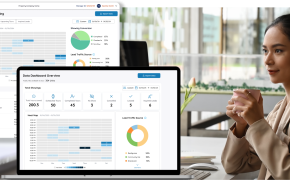As technology advances, cloud-based solutions are taking over the proptech space and revolutionizing existing products. Traditional entry communication systems—more widely known as intercoms—are no exception. One such innovation is the virtual intercom system, which has gained popularity in recent years due to its convenience, flexibility, and security. In this blog, we’ll delve deeper into the workings of virtual intercom systems and explore their benefits compared to traditional intercoms.
What is a Virtual Intercom System?
A virtual intercom system facilitates communication between residents and visitors. It also enables the resident to grant access to the building or community. The key difference is that the virtual intercom’s cloud-based platform allows users to activate the intercom function via their smartphones, rather than a fixed piece of hardware. This means residents can receive an intercom call and grant access at any time, even when they aren’t home. This also means visitors are free to navigate the community without ending the call. Leasing staff can even answer intercom calls and grant access from off site, saving time and resources.
Here is an example of how a virtual intercom system could be setup:
- Cloud-based platform: The virtual intercom system is hosted on a cloud-based server, which acts as the central hub for all communication and data processing.
- Entry point device: This is the physical device installed at the entry point, such as a door or gate. It may feature a camera, microphone, and/or speaker.
- Internet connection: The entry point device connects to a cloud-based platform via a wired or wireless internet connection.
- User Interface: Users can access the virtual intercom system through a mobile app or web-based interface, allowing them to see and communicate with visitors, as well as grant or deny access remotely.
How Everything Works Together
When a visitor arrives at the entry point, they will need to scan the QR-code, on the access panel, for access to the resident directory. The visitor then searches for a specific unit listed on the resident directory. Once a section is made, a video or audio call is routed through the cloud-based platform to the designated user’s smartphone or computer.

Residents can then see and communicate with the visitor through the mobile app or web interface. If they decide to grant access, they can remotely unlock the door or gate with a simple tap or click, eliminating the need for physical keys or fobs.

The Benefits of Virtual Intercom vs. Traditional Intercom
Compared to traditional hardwired systems, virtual intercoms offer several advantages. For starters, there’s no need to install additional hardware in every unit. This allows the virtual intercom to easily scale to accommodate a growing community. The only installations necessary are at entrances or amenities.
Moreover, by reducing the need for on-premises hardware, virtual intercoms often have lower upfront and maintenance costs. This makes virtual systems a cost-effective solution for larger properties.
In multifamily communities, virtual intercoms provide a convenient way for residents and operators to monitor and grant access to visitors, enhancing safety and peace of mind. Many virtual intercom systems offer the same security features as traditional ones, such as visitor logging and photo/video capture, but with greater visibility.
Virtual intercom systems are finding widespread use in various settings due to their versatility and convenience. Whether for residential properties, commercial buildings, or business premises, these cloud-based communication platforms offer a scalable solution for managing all kinds of access.
Rently’s Access Panel with Intercom
The Rently Access Panel with Intercom is a new generation of access control solution that combines traditional access control and an e-ink display for mobile communication.

The combination of two services in one device allows for changing needs after deployment. For example, if a community suddenly experiences more theft, having the Access Panel with Intercom means you can enable the intercom service at the click of a button. If the need for intercom has subsided, you can also deactivate the intercom service.

The Access Panel with Intercom offers flexibility and convenience, seamlessly connecting via cellular, Wi-Fi, or Ethernet. It can act as a regular access keypad at amenities, or as an intercom at community entrances, with only one device required for any number of units.
Accessible via code, fob, or app, the Access Panel with Intercom enables residents to enjoy a keyless lifestyle. Additionally, property management teams gain comprehensive insights into access activity, guest photos, and more to increase visibility and security.
Whether enhancing security at the front gates or managing access to common area amenities like pools, gated garages, or elevator call buttons, Rently’s newest device has a solution for you.
If you are interested in learning about Rently’s Access Panel with Intercom, schedule a demo today!



